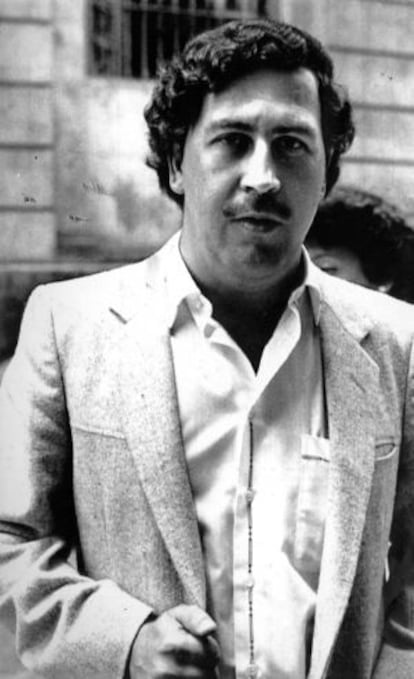Colombia to award compensation to one of Pablo Escobar’s victims
The family of a late opera tenor wins legal battle after years of litigation

For the first time ever, the Colombian government has agreed to pay state compensation to a victim of the late notorious drug lord Pablo Escobar.
Escobar, who was gunned down in 1993, ordered the bombing of an Avianca flight in 1989, believing that then-presidential candidate César Gaviria was on board. The jetliner blew up over Bogota killing all 107 people aboard, including two US citizens. It was considered one of the worst acts of drug-trade terrorism.
One of the passengers was Colombian opera tenor Gerardo Arellano.
“Abandonment of the victims is now in the past,” said Federico Arellano, the opera singer’s son, who has been leading the fight to help the families of the flight victims seek compensation.
Arellano, a lawyer, was 12 years old when his father died. He has focused his practice on representing the families of the victims in court and presides over the Colombian Memorial Foundation, an organization that groups together around 60 families who lost their loved ones aboard Avianca Flight 203.
It is not known how much the Colombian government will pay the Arellano family, but the lawyer said that the “money is only a symbolic gesture.”
“What is important is the recognition; that there will be a public apology, historical memory, and guarantees that it won’t happen again,” he said in an interview with EL PAÍS.
After years of litigation, Arellano’s court victory came thanks to the ambitious Victims Law, which now provides a legal mechanism by which victims of the armed violence that plagued Colombia can receive some form of compensation. The law had been one of President Juan Manuel Santos major public policy objectives. It is believed that some five million people will be able to seek redress.
“Not one congressman, not one politician or any government official wanted to return our phone calls over the years,” Arellano said.
But the director of the government’s Victims Unit – which was created by the law – said on Wednesday that not all of Escobar’s victims or those who suffered by the armed violence will be compensated. “In case we receive statements on similar incidents, the unit will have to analyze each case individually to see if these events have some relation with the armed conflict,” the director, Paula Gaviria, said in a statement.
Arellano was successful in his case after arguing he was a victim of an armed conflict because there had been an alliance at the time between Escobar and Carlos and Fidel Castaño, the two brothers who founded the paramilitary movement in Colombia.
“They were the material authors of this crime, which was financed by Escobar and others who have not been brought to justice,” he said.
Federico Arellano remembers clearly what happened on November 27, 1989. His father had just returned from Madrid where he recorded what was to be his last album with Spanish pianist Zito Zelante. He was on his way to Cali where he was to sing at a memorial Mass for his own father.
Federico Arellano was about to leave for school when he found his mother sobbing on the floor. The radio was on, and the announcer was naming the list of victims in the terrorism attack. “My father was one of the first names they called out. It only hit about 11am when we arrived at the airport in Bogota,” he recalled.
Making the situation even more painful was the fact that his mother was at the time the chief administrator at the Bogota’s El Dorado International Airport and had to oversee the emergency operations.
There isn’t a precise figure on how many people were killed by Escobar. His former lieutenant, Jhon Jairo Velázquez, known as Popeye, has told authorities that he personally participated in 3,000 murders.
Throughout his nearly 20-year reign as the cocaine king and head of the Medellín cartel, the infamous Escobar ordered the killings of ministers, presidential candidates, politicians, judges, journalists, police officers, former colleagues and innocent citizens by way of car bombs, air crashes and hit men.
Most agree that the bombing of the Avianca jet was the cruelest of all of Escobar’s attacks. To mark the upcoming 24th anniversary of the tragedy, the families of the victims plan on planting 107 trees in Soacha, on Bogota’s outskirts – the site where the passenger jet fell.
Tu suscripción se está usando en otro dispositivo
¿Quieres añadir otro usuario a tu suscripción?
Si continúas leyendo en este dispositivo, no se podrá leer en el otro.
FlechaTu suscripción se está usando en otro dispositivo y solo puedes acceder a EL PAÍS desde un dispositivo a la vez.
Si quieres compartir tu cuenta, cambia tu suscripción a la modalidad Premium, así podrás añadir otro usuario. Cada uno accederá con su propia cuenta de email, lo que os permitirá personalizar vuestra experiencia en EL PAÍS.
¿Tienes una suscripción de empresa? Accede aquí para contratar más cuentas.
En el caso de no saber quién está usando tu cuenta, te recomendamos cambiar tu contraseña aquí.
Si decides continuar compartiendo tu cuenta, este mensaje se mostrará en tu dispositivo y en el de la otra persona que está usando tu cuenta de forma indefinida, afectando a tu experiencia de lectura. Puedes consultar aquí los términos y condiciones de la suscripción digital.








































